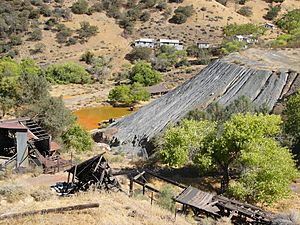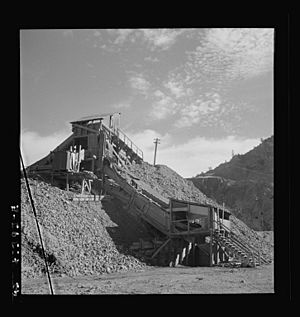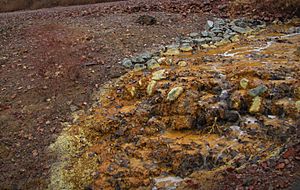New Idria, California facts for kids
Quick facts for kids
New Idria
Idria
|
|
|---|---|

New Idria grounds, 2004
|
|
| Country | United States |
| State | California |
| County | San Benito County |
| Elevation | 2,648 ft (807 m) |
| Time zone | UTC−8 (Pacific) |
| • Summer (DST) | UTC−7 (PDT) |
| ZIP codes |
95027 (discontinued)
|
| Area code | 831 |
| FIPS code | 06-36182 |
| GNIS feature ID | 1660786 |
| Official name: New Idria Mine | |
| Reference #: | 324 |
New Idria was a small, unincorporated town in San Benito County, California. It got its name from the New Idria Mercury Mine. When the mine closed in 1972, the town became a ghost town, meaning almost everyone moved away.
Contents
Where is New Idria?
New Idria is located in an area with the Area code 831. It is part of the Monterey Bay air quality district. The town is near San Benito Mountain, which is 5,241 feet (1,597 m) tall. The closest city is King City, found along U.S. Route 101.
The New Idria Mercury Mine was named after a very large mercury mine in Idrija, which was then part of Austria and is now in Slovenia. The town of New Idria grew to support the mining work. However, after the mine closed in the 1970s, the town became abandoned. Today, over 100 buildings are still standing, but some have been damaged. The area is officially known as both Idria and New Idria.
A Look Back at New Idria's History
The town of New Idria was created to support the mine. The mine mainly dug for mercury, which was found in a rock called cinnabar. Mercury mining started here in 1854. At one point, the New Idria mines were the second most productive in America. The New Almaden mines near San Jose, about 82 miles (132 km) away, were the most productive.
Mercury was very important for getting gold out of gold ore. This was especially true during the California gold rush. Before mines like New Idria and New Almaden started, most mercury came from Europe.
The New Idria Mining Company was formed in 1854. The town of New Idria began around 1857. By 1861, about 300 men worked at the mine. The first school opened in 1867, and a post office opened in 1869. In 1894, the post office dropped "New" from its name, and the town became known as Idria. The New Idria Quicksilver Mining Company stopped operating in 1972.
In 1871, a government report described the area around the mine. It said the land was very rough with mountains and deep canyons. It also noted that most of the land was barren and not good for farming. It was mainly a mining area.
On May 30, 1974, the town and its surrounding 2,000 acres were sold at an auction. Since then, the town has been a ghost town. The Idria post office closed on January 2, 1974.
New Idria is recognized as a California Historical Landmark (number 324). It was also home to the world's first Gould Rotary Furnace. This invention changed how ore was processed around the world.
On July 30, 2010, a fire destroyed 13 buildings on the north side of the town.
New Idria as a Superfund Site
In 2011, New Idria was listed as a U.S. Environmental Protection Agency (EPA) Superfund site. This happened because mercury was leaking from the old mine and polluting the area. As of June 2012, the part of the town on the south side of New Idria/Clear Creek road is fenced off to keep people safe.
Environmental Concerns in the Area
The EPA first looked into the New Idria Mercury Mine in the 1990s. They wanted to see if it should be added to their National Priorities List. At that time, it wasn't ranked high enough. However, new assessments began in 2002 and 2009. In March 2011, the EPA suggested adding New Idria to its National Priority List.
High levels of mercury were found in the streams near the town. There were also significant amounts of mercury and other heavy metals in the piles of leftover mining waste. This region has a long history of mining. Besides mercury, asbestos and chromium were also mined here. A 2004 EPA report found 86 abandoned mines nearby.
The natural rocks in the area have also been releasing asbestos-rich material for millions of years. On average, rocks in New Idria contain 5-15% short fiber asbestos. Because of this, some maps, like the 2010 Rand McNally Road Atlas, label the area south of New Idria as an "Asbestos Hazard Area."
Collecting Minerals
The New Idria Mining District is famous for its many rare minerals. One special mineral found here is benitoite, named after the San Benito River. This valuable gem is found only in this part of the world. New Idria also has a type of rock called serpentinite. Over time, many tectonic events have acted on the serpentinite. This has created large amounts of short-fiber asbestos.
Climate
| Climate data for Idria, California | |||||||||||||
|---|---|---|---|---|---|---|---|---|---|---|---|---|---|
| Month | Jan | Feb | Mar | Apr | May | Jun | Jul | Aug | Sep | Oct | Nov | Dec | Year |
| Record high °F (°C) | 83 (28) |
85 (29) |
90 (32) |
94 (34) |
99 (37) |
111 (44) |
113 (45) |
112 (44) |
111 (44) |
96 (36) |
87 (31) |
86 (30) |
113 (45) |
| Mean daily maximum °F (°C) | 55.7 (13.2) |
57.2 (14.0) |
60.1 (15.6) |
65.9 (18.8) |
76.1 (24.5) |
85.1 (29.5) |
92.5 (33.6) |
91.2 (32.9) |
85.1 (29.5) |
75.4 (24.1) |
59.7 (15.4) |
55.5 (13.1) |
71.6 (22.0) |
| Mean daily minimum °F (°C) | 37.2 (2.9) |
38.5 (3.6) |
39.5 (4.2) |
43.7 (6.5) |
49.8 (9.9) |
57.6 (14.2) |
64.9 (18.3) |
64.4 (18.0) |
58.6 (14.8) |
51.1 (10.6) |
41.0 (5.0) |
37.1 (2.8) |
48.6 (9.2) |
| Record low °F (°C) | 14 (−10) |
18 (−8) |
18 (−8) |
21 (−6) |
30 (−1) |
34 (1) |
40 (4) |
41 (5) |
36 (2) |
29 (−2) |
21 (−6) |
14 (−10) |
14 (−10) |
| Average precipitation inches (mm) | 2.77 (70) |
2.96 (75) |
2.42 (61) |
1.36 (35) |
0.44 (11) |
0.06 (1.5) |
0.02 (0.51) |
0.07 (1.8) |
0.22 (5.6) |
0.58 (15) |
1.63 (41) |
2.65 (67) |
15.18 (384.41) |
| Average snowfall inches (cm) | 0.1 (0.25) |
0.0 (0.0) |
0.3 (0.76) |
0.0 (0.0) |
0.0 (0.0) |
0.0 (0.0) |
0.0 (0.0) |
0.0 (0.0) |
0.0 (0.0) |
0.0 (0.0) |
0.0 (0.0) |
0.0 (0.0) |
0.4 (1.01) |
| Source: WRCC | |||||||||||||
See also
 In Spanish: New Idria para niños
In Spanish: New Idria para niños
 | Kyle Baker |
 | Joseph Yoakum |
 | Laura Wheeler Waring |
 | Henry Ossawa Tanner |






